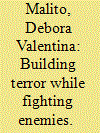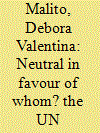| Srl | Item |
| 1 |
ID:
141895


|
|
|
|
|
| Summary/Abstract |
Somalia has become a front in the US Global War on Terror (GWoT) because of the potential connection between terrorism and state fragility. While originally oriented towards ‘building states while fighting terror’, Enduring Freedom in Somalia obtained quite the opposite result of deepening the existing conflict. Why and how did the GWoT result in the controversial outcome of ‘building terror while fighting enemies’? This article argues that the GWoT sponsored in Somalia an isolationist strategy that encouraged the political polarisation and military radicalisation of the insurgency. To explore this argument, the article first analyses the structure of the intervention by focusing on the interests and strategies of the interveners. Then it evaluates the conditions under which the modality of intervention (through the use of diplomatic, economic and coercive measures) violated the conditions essential to resolving conflict.
|
|
|
|
|
|
|
|
|
|
|
|
|
|
|
|
| 2 |
ID:
151533


|
|
|
|
|
| Summary/Abstract |
To what extent is making peace not a neutral or impartial exercise? By analysing the peace initiatives undertaken in Somalia and Somaliland (1991–95), this article questions the positionality and alignment of the actors involved, and claims that neither process has been an impartial exercise. To explore this argument the article first theoretically frames how supporters and critics of liberal peace elaborate on the dilemma of neutrality and impartiality. Departing from Lederach’s criticism of impartiality, I claim that the UN–US intervention in Somalia has been an instrument of division, as well as leverage for political and military advantage. External interveners have initially subverted the internal distribution of power, but they lacked the commitment and material capacity of sustaining the preferred ‘winning’ faction. By unpacking the category of ‘local’ I then map the protagonists of the Somaliland pacification, as well the mechanism of institution-building that enabled a multi-scale of stakeholders to sustain the conflict resolution. This analysis contributes to reconceptualise the political architecture of making peace. It also helps to disentangle the study of peace and violence from the myths of the liberal, neutral, intervention doctrine.
|
|
|
|
|
|
|
|
|
|
|
|
|
|
|
|